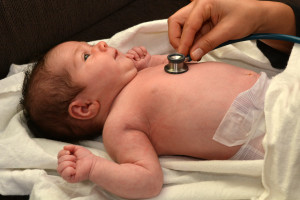
Every four and a half minutes, a baby is born in the United States with a birth defect. These defects may affect how the body looks or operates—and range from mild to severe. Some defects are very visible and can be noticed immediately, like cleft palate or Down syndrome. Some must be found using special tests, like echocardiograms, X-rays or hearing tests. Much has been written about the causes of birth defects and the role that genetics plays in having a child with one of these conditions. For some birth defects, like fetal alcohol syndrome, the cause is clear—drinking alcohol while pregnant. For others, the cause is more complex, and may be due to a variety of factors like our genes, behaviors and environment. While you cannot completely control your chances of giving birth to an infant with a birth defect, there are some ways you can lower your risk:
• Avoid smoking. Smoking during pregnancy can cause babies to be born too small, or too early. Smoking affects your developing baby’s health and can lead to a birth defect called an orofacial cleft. Quitting before getting pregnant is best, but it’s never too late to quit.
• Avoid drinking alcohol at any time during pregnancy. Fetal alcohol spectrum disorders (FASDs) are completely preventable if a pregnant woman avoids alcohol completely during her pregnancy. There is currently no “safe” amount of alcohol to drink during pregnancy so it is best to abstain completely.
• Avoid marijuana and other drugs. A baby born to a woman who has used illegal drugs during her pregnancy may be born too small, or too early. There is no yet known “safe” amount of marijuana to consume during pregnancy, so it is best to abstain completely.
• See your doctor regularly and start prenatal doctor visits as soon as you become pregnant. Prenatal care is essential to the health of a pregnant woman and her child. Her doctor can carefully monitor the pregnancy to ensure she is progressing normally.
• Take 400 mcg of folic acid every day. Folic acid is a B vitamin and is essential to help prevent major birth defects of the brain and spine. Folic acid is present in some foods, but the best way to get at least 400mcg is to take a daily supplement. It is recommended to begin this supplement one to three months before getting pregnant.
• Don’t start or stop taking any medications during pregnancy without the approval of your doctor. Certain medications, if taken during pregnancy, can cause serious birth defects. Other medications and their safety during pregnancy have not yet been fully studied, so pregnant women should not stop taking medications they need nor start taking new medications without first speaking to their doctor. This includes prescriptions, over the counter medications and herbal supplements.
• Reach and maintain a healthy weight. A woman who has a BMI of more than 30 before pregnancy is at a higher risk for complications during pregnancy. Obesity also increases a pregnant woman’s risk of several serious birth defects. Women who have high BMIs should talk to their doctor about ways to reach a healthy weight before becoming pregnant.
• Keep any medical conditions such as diabetes or high blood pressure under control. These conditions can cause serious birth defects if left untreated. Poor control of diabetes increases chances of birth defects and can also cause complications for the pregnant woman. High blood pressure can raise risk of preeclampsia, which can lead to early term labor.
• Get vaccinated. Stay up to date on adult vaccinations and make sure to receive any during pregnancy that will help keep healthy.
Disclaimer: The contents of this article, including text and images, are for informational purposes only and do not constitute a medical service. Always seek the advice of a physician or other qualified health professional for medical advice, diagnosis, and treatment.








